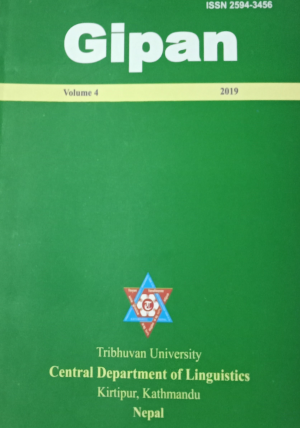Honorification in Nepali: a psycholinguistic perspective
DOI:
https://doi.org/10.3126/gipan.v4i0.35458Keywords:
honorification, psycholinguistic perspecitive, royalese, neutralization, distal/proximal, Nepali languageAbstract
This research article explores the psycholinguistic processes of honorification manipulation in Nepali language. Honorification is not static but dynamic process and is affected by many factors including psychological. Data is drawn from published narratives, mostly in the Nepali media, and analyzed from psycholinguistic perspective. The range of data include politics, royalese, language of marital discord and media. Significant influencers in choice of honorifics are fluctuation in state of mind and proximality. The canonical three-level honorific system is discussed as a reference point for psychologically motivated honorification fluctuation. Three types of honorific operators are identified and discussed: psychological, royalese and neutralization. The article attempts to bring forth the complex mechanisms that work on the honorification system in Nepali language.
Downloads
Downloads
Published
How to Cite
Issue
Section
License
This license enables reusers to distribute, remix, adapt, and build upon the material in any medium or format for noncommercial purposes only, and only so long as attribution is given to the creator.

